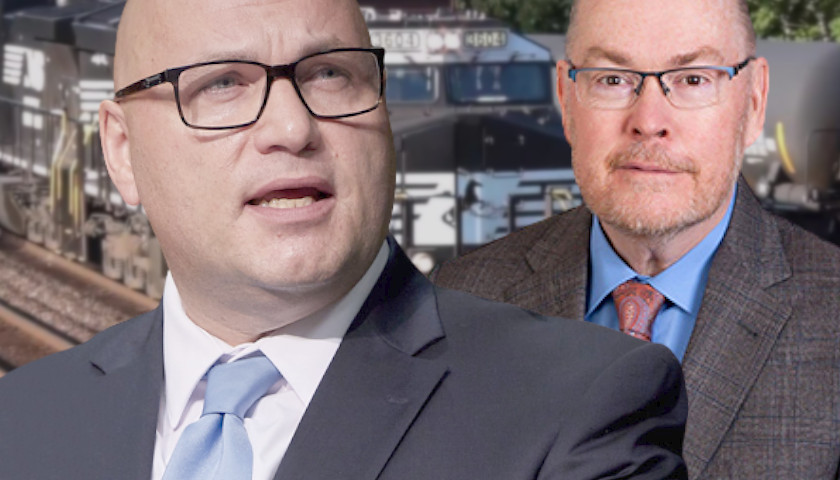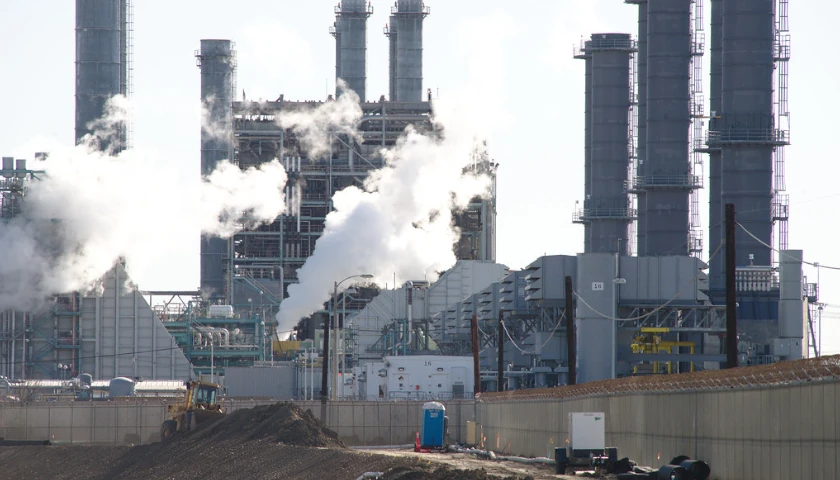Two Pennsylvania state lawmakers representing areas affected by the February train derailment less than a mile beyond the Ohio border are drafting legislation to enhance railroad safety rules.
The emerging bill by State Representatives Jim Marshall (R-Beaver Falls) and Rob Matzie (D-Ambridge) would tighten maintenance and oversight standards for wayside hotbox detectors, limit the length of trains, set a minimum number of train staff, toughen supervision of railroad safety compliance and facilitate reporting of violations. The legislators also say their measure will create a mechanism for better communication regarding the transportation of toxic substances.
“The consequences of the train derailment in East Palestine have been profound to my constituents, and it is clear to me that we must act now to prevent further incidents,” Marshall (pictured above, right) said in a statement. “I am appreciative of the opportunity to work together with [House Consumer Protection Committee] Chairman Matzie on this important issue.”
His co-sponsor suggested that current federal regulations inadequately address freight-transportation dangers.
“Our area is one of the most heavily traveled in the country for rail traffic, which means that safety problems create a very real and immediate threat for residents right in our own backyards,” the Democrat said. “As the recent East Palestine derailment made clear, we can’t rely on federal safety standards to protect us.”
Matzie (pictured above, left)’s interest in heavier regulation of the railroad industry is new; he is among numerous Keystone State politicians who received donations from the Norfolk Southern Corporation Good Government Fund last year — $2,000 in his case.
Whatever the merits of the proposed changes — and whatever ability the commonwealth has to adopt them given that the federal government oversees interstate commerce — some experts are urging policymakers to consider the broader context of this issue.
For instance, two D.C.-based scholars recently pointed out that while state and federal policymakers have proposed mandating two-person crews for freight trains, the Norfolk Southern train that wrecked in East Palestine, Ohio had a crew of two as well as a trainee.
This was among a number of points raised by Cato Institute analysts David Kemp and Peter Van Doren in an assessment of media reactions to the incident, which saw numerous Norfolk Southern train cars — including five containing toxic vinyl chloride — run off track on February 3. The company proceeded to vent and burn those five vessels, a move supported by Governor Josh Shapiro (D) at the time. However, Shapiro has since criticized the rail company for burning five cars instead of just the one he said he was told about at the time. Area residents have since reported a number of human and animal health consequences and discoloration of local waterways.
Kemp and Van Doren explained that such rail accidents have become less frequent in recent decades. The total number of full freight vessels derailed in the U.S. each year peaked at 36,786 in 1978 and fell precipitously afterward. Wrecks of this kind last year totaled 3,037, the second-lowest number in at least a half-century.
Derailment figures have gotten more encouraging over the years, where trains carrying hazardous materials (hazmats) are also concerned. In 1978, 205 derailed cars emitted hazmats, while only 15 did in 2022. This is even though the number of American freight times the total distance that material was transported rose from “932 billion” ton-miles in 1980 to “1,440 billion” in 2020, a 55 percent increase.
The Cato scholars further debunk the oft-recited suggestion that the East Palestine accident may have occurred because the Trump administration nixed an Obama-era rule which directed some trains to use electronically controlled pneumatic (ECP) brakes. Yet even the Obama regulation would not have required the use of the advanced ECP devices for the train that crashed in February because the train had too few cars containing flammable hazmats. So extensively did the brake misinformation spread that National Transportation Safety Board Chair Jennifer Homendy publicly urged people to stop disseminating it.
“We do not suggest that there aren’t important lessons to be learned by railroads and regulators from the East Palestine derailment,” Kemp and Van Doren wrote. “But before any recommendations are made on how the incident should change the way we regulate freight rail, we should be sure that the derailment characteristics actually support those conclusions.”
– – –
Bradley Vasoli is managing editor of The Pennsylvania Daily Star. Follow Brad on Twitter at @BVasoli. Email tips to [email protected].
Photo “Rob Matzie” by Tom Wolf. CC BY 2.0. Background Photo “Norfolk Southern Train” by James St. John. CC BY 2.0.









This is what needs to be done and train companies need to be held accountable when they don’t do what the rules are. They obviously had NOT been having the cars inspected as often as they need to be. I know where I live in Ohio people are sitting and waiting on stopped trains for 30 mins and longer with no way to get around them.
I sure hope Ohio is working on the same issues.